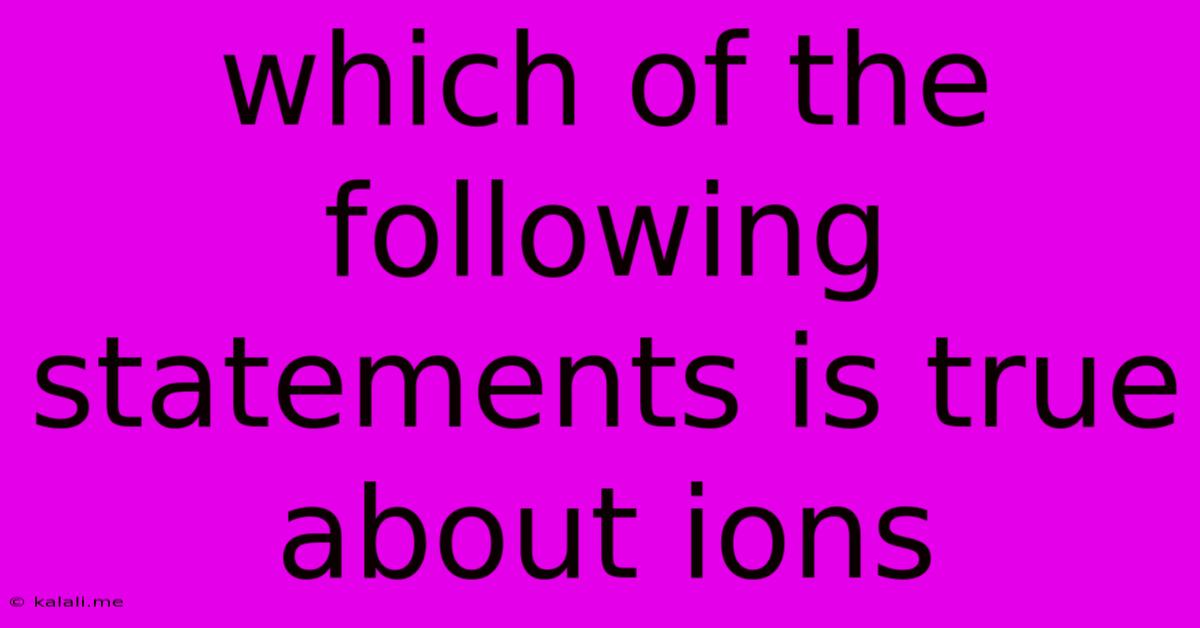Which Of The Following Statements Is True About Ions
Kalali
Jun 15, 2025 · 3 min read

Table of Contents
Which of the Following Statements is True About Ions? A Deep Dive into Charged Particles
This article explores the fundamental nature of ions, addressing common misconceptions and clarifying their key characteristics. Understanding ions is crucial in various scientific fields, from chemistry and biology to physics and geology. We'll examine several statements about ions and determine which accurately reflects their properties. The correct understanding of ionic behavior is key to comprehending many chemical and physical processes.
What are Ions?
Before delving into true and false statements, let's establish a foundational understanding. Ions are atoms or molecules that have gained or lost one or more electrons, resulting in a net electrical charge. This charge can be positive or negative, depending on whether electrons were lost (resulting in a positive ion, or cation) or gained (resulting in a negative ion, or anion). The formation of ions is a crucial aspect of chemical bonding and many chemical reactions.
Evaluating Statements About Ions:
Let's analyze some common statements regarding ions and determine their validity. To do this effectively, we need to understand the underlying principles governing their behavior.
Here are some example statements, followed by an analysis of their truthfulness:
-
Statement 1: Ions are electrically neutral. FALSE. By definition, ions carry a net electrical charge. The gain or loss of electrons disrupts the balance between protons (positive charge) and electrons (negative charge) in an atom or molecule.
-
Statement 2: Ions are formed through the transfer of protons. FALSE. Ions are formed through the transfer of electrons, not protons. Protons reside in the nucleus of an atom and are much more difficult to remove or add compared to electrons in the outer shells. Changing the number of protons alters the element itself.
-
Statement 3: Cations are positively charged ions. TRUE. Cations are ions that have lost electrons, resulting in a net positive charge because they have more protons than electrons. Examples include sodium ions (Na⁺) and calcium ions (Ca²⁺).
-
Statement 4: Anions are negatively charged ions. TRUE. Anions are ions that have gained electrons, leading to a net negative charge due to a greater number of electrons than protons. Examples include chloride ions (Cl⁻) and oxide ions (O²⁻).
-
Statement 5: Ionic compounds are formed through the sharing of electrons. FALSE. Ionic compounds are formed through the transfer of electrons between atoms, creating electrostatic attraction between oppositely charged ions (cations and anions). The sharing of electrons is characteristic of covalent bonding.
-
Statement 6: The charge of an ion indicates the number of electrons gained or lost. TRUE. The magnitude of the charge (e.g., 1+, 2-, 3+) directly reflects the number of electrons gained or lost during ion formation. A +2 charge signifies the loss of two electrons, while a -1 charge indicates the gain of one electron.
Conclusion:
Understanding the properties of ions is fundamental to grasping many concepts in chemistry and related fields. By analyzing the statements above, we've clarified the key characteristics of ions, emphasizing the role of electron transfer in their formation and the significance of their electrical charge in chemical interactions and the formation of ionic compounds. Remember that ionic bonding, a consequence of ion formation, is drastically different from covalent bonding, which arises from electron sharing. This distinction is crucial in understanding the diverse properties of different chemical substances.
Latest Posts
Latest Posts
-
Which Of The Following Has The Highest Frequency
Jun 15, 2025
-
The Temperature Increase With Depth Is Called The Geothermal
Jun 15, 2025
-
Distance From North Pole To Equator
Jun 15, 2025
-
Which Statement Best Distinguishes Plant Cells And Animal Cells
Jun 15, 2025
-
Average Sat Score For East Carolina University
Jun 15, 2025
Related Post
Thank you for visiting our website which covers about Which Of The Following Statements Is True About Ions . We hope the information provided has been useful to you. Feel free to contact us if you have any questions or need further assistance. See you next time and don't miss to bookmark.